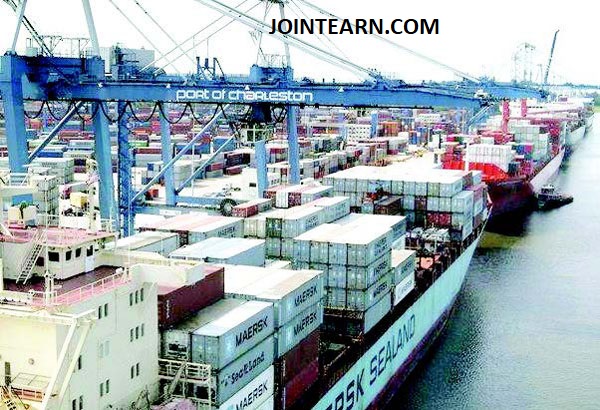In a bid to improve port operations and drive competitiveness in Nigeria’s maritime sector, the Nigerian Shippers’ Council (NSC) has entered into a strategic partnership with a British organization to enhance efficiency across the country’s seaports. The collaboration is expected to yield significant reforms in cargo handling, logistics coordination, and trade facilitation within the nation’s port ecosystem.
The initiative, which forms part of ongoing efforts to modernize Nigeria’s port infrastructure, was unveiled during a high-level engagement between officials of the NSC and a delegation from the United Kingdom. At the heart of the partnership is a shared commitment to adopting global best practices, deploying innovative port management systems, and ensuring seamless port-user experience.
Speaking during the meeting, the Executive Secretary and Chief Executive Officer of the Nigerian Shippers’ Council, Barrister Pius Akutah, emphasized that port efficiency is central to Nigeria’s economic development and the overall competitiveness of West Africa’s supply chain. He noted that the collaboration with the UK-based entity would focus on key areas such as digital transformation, operational transparency, and regulatory alignment.
“This partnership comes at a critical time when Nigeria is working toward becoming a major hub for maritime trade in Africa,” Akutah said. “Our goal is to reduce cargo dwell time, cut down on inefficiencies, and enhance the ease of doing business at our ports. By tapping into the experience and technical capacity of our British partners, we are confident that significant progress will be made.”
According to the NSC, the collaboration will involve technical assistance, knowledge exchange programs, training of port operators and regulatory agencies, and deployment of port performance monitoring tools. It will also include collaborative studies and assessments to identify bottlenecks and recommend data-driven solutions tailored to Nigeria’s unique port environment.
The British delegation, led by senior officials from a maritime consultancy group, expressed optimism about the partnership and reaffirmed their commitment to supporting Nigeria’s port reform agenda. The team highlighted the importance of aligning Nigeria’s port procedures with global standards, particularly in light of increasing regional trade under the African Continental Free Trade Area (AfCFTA).
A member of the delegation, Mr. James Harrington, stated, “Nigeria has enormous potential to lead in regional logistics. With strategic investments in port infrastructure and a strong focus on efficiency, Nigeria can transform its maritime sector into a regional benchmark. Our partnership with the Nigerian Shippers’ Council aims to accelerate this transformation by providing the tools and expertise necessary for sustainable port operations.”
The initiative has drawn positive responses from industry stakeholders, including freight forwarders, shipping companies, logistics operators, and terminal managers, who have long advocated for improved operational coordination and regulatory harmonization at Nigerian ports. Many have described the NSC’s partnership approach as a step in the right direction, particularly in addressing systemic delays and inefficiencies that have cost shippers millions in demurrage and storage charges.
Among the core objectives of the partnership are the following:
-
Reduction in Cargo Dwell Time: Current port processes often result in excessive delays for cargo clearance. The initiative will introduce time-bound benchmarks and automated tracking systems to ensure prompt cargo movement.
-
Capacity Building: Training and development programs will be conducted for customs officials, port workers, and logistics professionals to build technical skills and foster a service-oriented port culture.
-
Improved Stakeholder Engagement: The initiative will promote dialogue among port users, regulatory bodies, and service providers through regular feedback sessions and joint performance reviews.
-
Adoption of Smart Port Technologies: Emphasis will be placed on deploying digital tools such as port community systems, cargo tracking platforms, and electronic payment solutions to improve visibility and transparency.
-
Regulatory Reforms and Policy Advocacy: The collaboration will support the development of policy frameworks that enhance compliance, reduce bureaucracy, and eliminate duplicative processes.
The Nigerian Shippers’ Council has reiterated that the success of the partnership will depend on effective inter-agency collaboration, political will, and the active participation of all stakeholders in the maritime value chain. The Council has also indicated plans to replicate this model with other international partners, as part of a broader effort to reposition Nigeria’s ports as globally competitive gateways for trade.
This renewed focus on port efficiency aligns with Nigeria’s economic diversification agenda and its drive to improve non-oil exports. By enhancing port operations, the government aims to attract more shipping traffic, increase trade volumes, and reduce logistics costs for businesses operating in and out of Nigeria.
As the partnership takes off, both parties are expected to unveil a roadmap outlining short-, medium-, and long-term targets, with regular performance reviews to ensure measurable progress. The Nigerian maritime sector, long plagued by inefficiencies and logistical hurdles, may soon begin to see the turnaround stakeholders have long anticipated.












